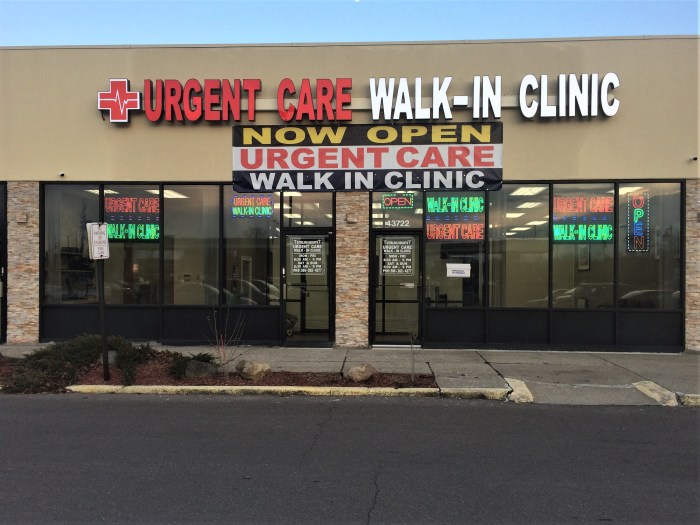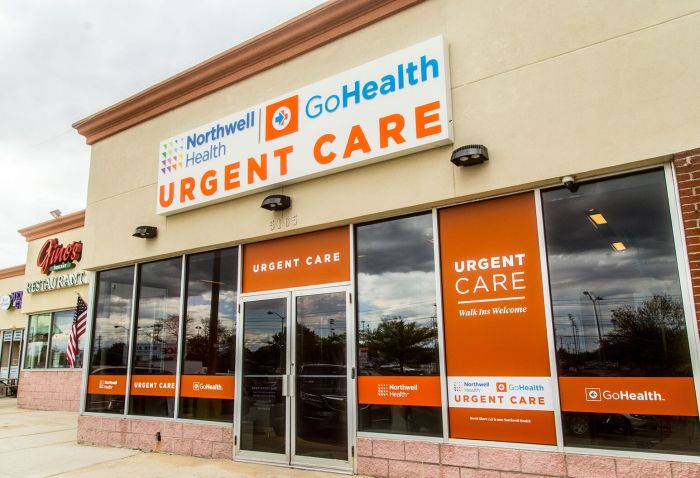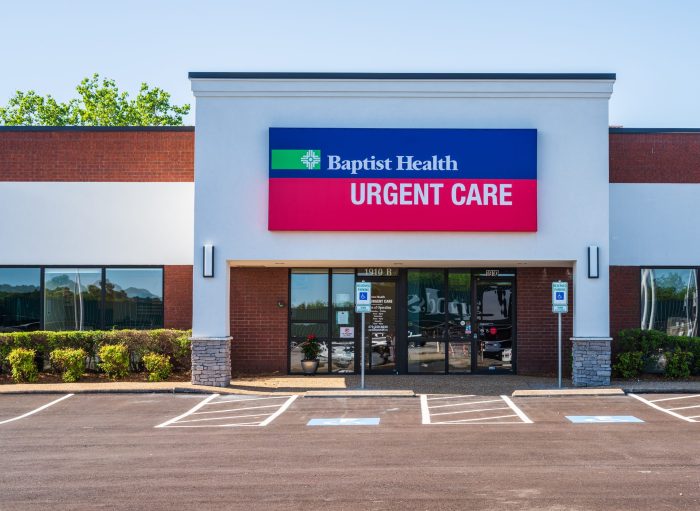Urgent medical care near me is a lifesaver when you need prompt medical attention but don’t require the services of an emergency room. Learn how to identify urgent care facilities, the conditions they treat, and the benefits of seeking urgent medical care.
In this comprehensive guide, we’ll explore the world of urgent medical care, empowering you with the knowledge to make informed decisions about your healthcare.
Definition of Urgent Medical Care

Urgent medical care refers to a level of medical attention that is required for conditions that are not life-threatening but require prompt medical intervention to prevent serious consequences. Unlike emergency care, which is reserved for life-threatening situations, urgent medical care addresses conditions that can worsen if not treated promptly.
Types of Conditions Requiring Urgent Medical Attention
Common conditions that typically require urgent medical care include:
- Severe pain or discomfort
- High fever
- Difficulty breathing
- Head injuries
- Broken bones or sprains
- Cuts or wounds that require stitches
- Urinary tract infections
- Skin infections
- Eye infections
Identifying Urgent Medical Care Facilities

When faced with a non-life-threatening medical issue that requires prompt attention, urgent medical care facilities offer a convenient and accessible option. These facilities provide immediate medical care for a wide range of conditions, bridging the gap between primary care and emergency room visits.
Locating Urgent Medical Care Facilities
Locating urgent medical care facilities near a specific location is a crucial step in accessing timely medical attention. Here are some effective methods:
- Online Directories:Websites like Healthgrades, WebMD, and Urgent Care Locator provide comprehensive listings of urgent care facilities in a given area, along with their contact information, hours of operation, and available services.
- Local Search Engines:Searching for “urgent care near me” or “walk-in clinic near me” on search engines like Google or Bing will yield a list of nearby facilities, complete with directions and contact details.
- Insurance Provider:Contacting your insurance provider can provide information about in-network urgent care facilities within your coverage area.
Types of Urgent Care Facilities
There are two primary types of urgent care facilities:
- Walk-in Clinics:These clinics are typically located in retail centers or strip malls and offer basic medical services, such as treatment for minor illnesses, injuries, and vaccinations. They usually operate on a first-come, first-served basis.
- Urgent Care Centers:These centers are larger and more comprehensive than walk-in clinics and provide a wider range of services, including X-rays, laboratory tests, and treatment for more complex medical conditions. They often have longer hours of operation and may require appointments.
Factors to Consider When Choosing an Urgent Care Facility
When selecting an urgent care facility, consider the following factors:
- Hours of Operation:Ensure that the facility’s hours of operation align with your availability and the urgency of your condition.
- Availability of Services:Determine if the facility offers the necessary services for your medical issue. Consider factors such as X-ray capabilities, laboratory testing, and specialized treatments.
- Location:Choose a facility that is conveniently located and accessible for you.
- Insurance Coverage:Verify that the facility accepts your insurance plan or offers affordable payment options.
Benefits of Urgent Medical Care
Urgent medical care facilities offer several advantages compared to other healthcare options, including timely access to treatment, reduced waiting times, and cost-effectiveness.
One of the primary benefits of urgent medical care is its timely response to non-life-threatening medical conditions. Urgent care clinics are typically open during extended hours, including evenings and weekends, providing patients with convenient access to medical attention when they need it most.
This can be particularly beneficial for individuals who have difficulty scheduling appointments with their primary care physician or for those who experience sudden illnesses or injuries outside of regular business hours.
Reduced Waiting Times
Urgent care clinics are designed to provide efficient and timely care, minimizing wait times for patients. Unlike emergency rooms, which prioritize life-threatening conditions, urgent care facilities typically have shorter wait times, allowing patients to receive treatment promptly.
Cost-Effectiveness
Urgent medical care is generally more cost-effective compared to emergency room visits or hospitalizations. The charges for urgent care services are typically lower than those associated with emergency room visits, and they may also be covered by insurance plans. In contrast, emergency room visits can result in substantial out-of-pocket expenses, especially for uninsured individuals.
Conditions Treated in Urgent Medical Care

Urgent medical care facilities are equipped to handle a wide range of non-life-threatening conditions that require prompt medical attention. These conditions typically fall into several categories, including:
Respiratory Issues, Urgent medical care near me
- Colds and flu
- Bronchitis
- Pneumonia
- Asthma attacks
- Sinusitis
Musculoskeletal Injuries
- Sprains and strains
- Broken bones
- Muscle tears
- Joint pain
- Back pain
Infections
- Urinary tract infections (UTIs)
- Skin infections
- Ear infections
- Eye infections
- Viral infections (e.g., mono)
Other Conditions
- Allergies
- Dehydration
- Fever
- Vomiting and diarrhea
- Minor cuts and burns
Preparation for Urgent Medical Care Visit
When seeking urgent medical care, it is essential to be prepared for a prompt and efficient visit. This preparation can enhance the quality of care you receive and ensure a smooth experience.
Before visiting an urgent care facility, take the following steps:
Gather Relevant Medical Records
Bring any relevant medical records, including past medical history, current medications, and any recent test results. This information will help the healthcare provider understand your condition and provide the most appropriate treatment.
Bring Insurance Information
Provide your insurance information, including your insurance card and any necessary co-pays or deductibles. This will help the facility process your payment and avoid any delays in receiving care.
Be Prepared to Discuss Symptoms
Be ready to clearly and concisely describe your symptoms to the healthcare provider. This includes the onset of symptoms, their severity, and any associated factors that may have contributed to your condition.
Consider Your Payment Options
If you are unable to pay for the visit upfront, discuss payment options with the facility staff. Many urgent care facilities offer payment plans or can refer you to financial assistance programs.
Follow-Up Care
After receiving urgent medical care, it’s crucial to follow up with your primary care physician (PCP) for continued care and monitoring.
Your PCP can provide comprehensive evaluations, ongoing treatment plans, and preventive care to ensure your health and well-being. They can also order additional tests or treatments based on the diagnosis made during your urgent care visit.
Finding a Primary Care Physician
- Ask for referrals:Seek recommendations from friends, family, or other healthcare providers.
- Check online directories:Utilize resources like the American Medical Association (AMA) or your health insurance provider’s website to search for PCPs in your area.
- Visit local clinics or hospitals:Inquire about primary care services offered by these facilities and request information about available providers.
Ultimate Conclusion: Urgent Medical Care Near Me
Urgent medical care provides a vital bridge between emergency care and primary care, offering accessible and affordable healthcare for a wide range of non-life-threatening conditions. By understanding the nuances of urgent medical care, you can ensure you receive the right treatment at the right time.
FAQ Insights
What are the most common conditions treated in urgent care facilities?
Urgent care facilities typically treat a wide range of conditions, including respiratory issues (such as colds, flu, and bronchitis), musculoskeletal injuries (such as sprains, strains, and fractures), infections (such as urinary tract infections and strep throat), and minor cuts and burns.
How much does an urgent care visit typically cost?
The cost of an urgent care visit varies depending on the facility, the services provided, and your insurance coverage. However, urgent care visits are generally more affordable than emergency room visits.
What should I bring to my urgent care visit?
When visiting an urgent care facility, it’s important to bring your insurance card, a list of your current medications, and any relevant medical records. You may also want to bring a photo ID and a form of payment.






Leave a Comment